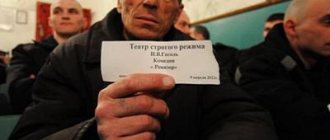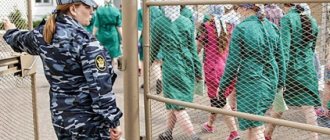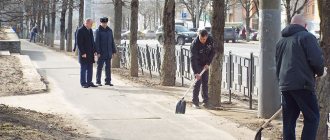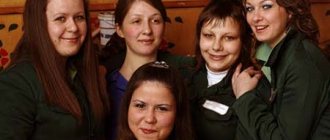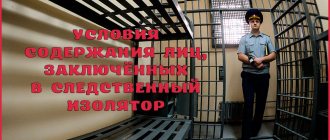Women's prison...According to the prisoners themselves serving their sentences, complete chaos reigns here. Even the guards who previously worked with male prisoners come to work here with great reluctance. No, the zone for women is not famous for its cruelty and the frequency of murders and suicides, but it is known for the sophisticated methods of bullying experienced prisoners against young prisoners. When they first get behind bars, many girls are indescribably horrified by the “orders” imposed on them not by the law, but by prisoners with “experience.” So how can women convicted of various crimes get through the hell of prison? How can they not break down and be released with a healthy body and psyche?
Be yourself
Experienced prisoners, “seasoned prisoners,” know that once in prison or in a zone, it is better not to show excessive emotions at first. Don't show everyone panic; There is also no need to curry favor with older prisoners. The best option here is natural, simple behavior, which, however, does not imply excessive openness and gullibility.
Yes, conflicts in the zone are inevitable, but it is still necessary, if possible, not only to avoid them, but also to level out any quarrels that arise. Oddly enough, a sense of humor helps a lot here.
Theft in a women's prison is unacceptable - the caught "rat" will first be severely punished, and later - until the end of his entire sentence - he will be despised. There are known cases where thieves were deliberately spat on in their food and forced to eat it all. “Ratting” in the zone is the most disgusting act, in the opinion of the prisoners and those watching.
Loyalty to other prisoners is an excellent policy. Subservience in the women's area is despised, but polite, calm treatment of friends in misfortune is approved. When communicating with other prisoners, you should always ask permission to do something. For example, if you want to sit on the bunk (bed) of another “lady,” you should find out if she will allow it.
Detachment and withdrawal into your own world is not the best way to survive in prison. Such behavior will inevitably lead a woman to depression, especially if her sentence is long. Over time, it is better to find common interests with other prisoners, learn to make something, sew, sculpt: such tactics will make it easier to survive isolation from society.
Keep your mouth shut
When communicating with new friends, you should not rush to tell them everything about yourself, to throw out accumulated emotions and experiences. There is no need to talk about the past even if other prisoners insist on it. If you wisely, without offending anyone, joke about this topic a couple of times, women will understand their cellmate and stop asking unpleasant questions. The correct policy is to say little, but listen more often to the conversations of others.
Since sex life in the zone practically ceases, prisoners constantly discuss this topic. You should never share your preferences with others or talk about sexual experiences. A woman in prison can avoid forced homosexual relationships only if she avoids discussing intimacy and can politely refuse an overly persistent friend.
Among the prisoners there are many women dependent on drugs. Even while in prison, they try by any means to get a potion for themselves. These prisoners will agree to any agreement with the guards and guards - just to get the deadly dope. They betray, “sell” their friends for a dose, and commit new crimes. Such prisoners should be avoided.
Active cooperation with prison employees is considered “snitching” and betrayal. It is best for women behind bars not to “negotiate” with the administration and not to pass on information heard from cellmates to supervisors and guards.
A WOMAN'S PORTION: ABOUT LIFE IN A COLONY-SETTLEMENT AND ABOUT DREAMS OF FREEDOM
150 kilometers from Kazan is the village of Digitli, where 120 people, 25 of them women, are serving sentences for their crimes. The regime in the colony-settlement is not as harsh as in a prison - there is no barbed wire, angry dogs and guards with weapons.
Convicts can come here on their own, without escorts. When we were approaching the colony, we came across a guy with a travel bag - as it turned out, we were on our way. He walked to the colony to serve his sentence here.
The place where the colony is located is located in an open hilly area - open space and fields. The only reminders that there is a correctional facility here are the checkpoint and the sign on the wall of the administrative building.
In this colony-settlement, convicts serve sentences for theft, drug use and fraud, that is, the criminals here are not dangerous, and therefore, the conditions for them are more lenient.
Convicts can work in agricultural enterprises and in the clothing production of KP No. 17. Here they can also receive an education.
We walked into the women's dorm where we were greeted by several women milling around the entrance. Some of them smiled in greeting, others lowered their eyes and tried not to attract attention to themselves.
In the dormitory rooms there are metal bunk beds with signs indicating the information of the convicted persons. Everything is neat and clean—you can feel the discipline. Women live strictly according to routine, almost like in the army.
Twenty years of experience
Natalya Polyakova was the first to volunteer for the conversation. We immediately noticed her makeup. As it turns out, using cosmetics is not forbidden here, and women always try to look good.
When convicts are called to the authorities, they immediately read out their last name, first name, patronymic, term of serving the sentence and article. Natalya started the conversation with us in the same way.
“Polyakova Natalya Mikhailovna, article 158 part two, term of four years in a penal colony. The period begins on November 25, 2016 and ends on November 24, 2020,” the woman reported.
We tried to make our conversation more informal. She said that this is not her first term. She first went to jail for theft, then she was only eighteen. At 20, history repeated itself. All four sentences were for the same article – “Theft”. While serving her next sentence, the woman will turn 40 years old.
“Maybe if they didn’t imprison me the first time, then I wouldn’t be able to sit down. But that’s how it happened,” says Natalya.
The woman's prison life began in 1996. She was influenced by the environment that formed at that time and the situation in the family, she is sure.
Natalya is from Volzhsk; she served previous sentences in Chuvashia - in Alatyr, Kozlovka and Tsivilsk.
“I have a son, he studies in a cadet school in Kazan, he is 16 years old. My mother does not work for me, she is a pensioner. From birth I was raised by my stepfather, he works in the fire department. She was married, her husband died a long time ago. They don’t take my son here, but he’s eager to go. We only communicate by phone, but my parents come constantly and send packages,” she says about her family.
Most often, people who grow up in dysfunctional families end up behind bars. In Natalya’s case, it seems that everything is the other way around, is she not telling something...
Convicts, like ordinary people, work in a colony and receive a salary, however, after all deductions, two to three thousand rubles are left at free disposal. Cash is not given out in person, but transferred to a special card that can be used to pay at a local store.
According to the law, the convicted person must retain at least 25 percent of the entire amount earned. The state calculates payments for housing, utilities, food and clothing, and those who have lawsuits or alimony are calculated first. Our interlocutor has a claim in the amount of 80 thousand rubles, but she will also have to pay this amount while free.
Here in the colony, Natalya works as an orderly. This work has been made easier - the woman recently underwent surgery. When she gets better, she will go back to work in the sewing industry.
“I am a fourth-class seamstress by education; I studied in a colony in Kozlovka while I was serving my sentence. There we sewed uniforms, and here we sewed pillowcases and sheets. The profession was useful in the wild. In principle, I like it,” shares Natalya.
According to statistics, the majority of convicts mastered their profession in correctional institutions. For some of them, this is the only opportunity to get an education.
Natalya's working day lasts eight hours, the work is not hard, you just need to keep order and cleanliness, at the same time she even manages to do her own business.
According to Natalya’s stories, it seems that there are good and friendly relations among the convicts. In the evening they watch TV, in the summer they play football, some read, some knit. Life goes on at its own pace, even without freedom. After her release, Natalya wants to go to work and hopes that she will not return here again.
Deprivation of parental rights
Ekaterina Feoktistova is a woman with red curly hair and piercing green eyes. She agreed to talk, but with caution.
Ekaterina is 35 years old, and she has been serving a sentence for drug use for almost a year. The woman shared that a conflict in her family pushed her to use drugs.
Ekaterina was born in Kazan, grew up, by her own admission, in a prosperous family - her mother is a pastry chef, her father is a high-altitude electrician. Her ten-year-old daughter is waiting for her at home.
“My daughter is in fourth grade, she likes math and English. She never came here to see me, I don’t want to traumatize the child. This is not necessary,” shares Ekaterina.
Of course, the girl misses her mother and really wants to come.
“We try in every possible way so that people don’t ask to come here. They just tell her that wait a little longer, mom will be home soon,” explains the woman.
Katya is a seamstress by profession and continued to work in the same profession in the colony.
In their free time, convicts can sew something for themselves - this is not prohibited. In general, there are not many restrictions on free time. Convicts can play sports, watch TV and just socialize.
“Sporting events take place here, boys play football, girls support. Physical education in the morning. Everything is fine, everything is here,” says Ekaterina.
When asked what is especially lacking in the colony, the woman answers – family and home.
While talking about cultural life, they don’t forget about holidays. The convicts prepare concerts and congratulate each other with songs and dances. So, on New Year’s Eve, Ekaterina played the role of the Snow Maiden for the first time in her life and admits that she really liked it.
The colony-settlement is often visited by representatives of the clergy, Katya always goes to such meetings.
“I’m not very friendly with religion. Yes, I may believe in something, but this is a purely personal matter for everyone. I am baptized, but I am interested in Islam. I have never been to a mosque, I am interested in going there. If I’m at home, I’ll definitely go,” admitted Ekaterina.
When asked about the future, Catherine does not give clear answers and admits that she does not know what she will do when free. For now, the woman only cares about restoring her parental rights.
“Initially, we need to solve global issues, then only think about work. My daughter is more important to me than my job. I’ll take care of my daughter first,” she says.
The woman only learned from journalists that she needed to find a job before her parental rights were restored. Thoughtful, she replied that at first she was counting on her mother’s help.
“How to protect a child from bad influences?” – we asked. Catherine was confused.
“I don’t know the answer to this question, to be honest. I thought about it, but I don't know. I don't think any parent knows. No matter how much we protect them, they become adults, begin to walk on their own, and you are no longer around. I don't know. I don’t know how my mother is, to be honest. I think any parent would agree with this. They will fly away, just like I flew away from under my parents’ wing. They didn't stop me either. And I don't know how it will be. This is our cross, and we have to bear it,” shared Ekaterina.
Ekaterina shared that when communicating with her daughter, she tries to be soft.
“We don’t fight, we’re friends, it’s easier to communicate with them. Naturally, no one likes to be shouted at. But it’s easier to be friends; you need to come to an agreement. I was raised this way, and I try to raise her the same way, that is, to be friends, not to fight. So far it's working. I will never interfere, let her choose her profession herself. She will move on in life on her own, I have no right to interfere. This is her life. So that they don’t tell me later that it’s your fault. Now they get a passport at the age of 14, they are already adults, let them choose for themselves,” shares Ekaterina.
On the eve of the holiday, we asked what Katya wanted to receive as a gift.
"I don't know. Right here? I just want congratulations. We don't need anything else. This is already nice, right? So that they don’t forget,” she replied.
Bad company
Our next interlocutor was Guzel Rybak. She is serving her sentence for the second time. Both sentences were for theft. Guzel is 39 years old, her adult children, husband and parents are waiting for her at home.
Guzel comes from Naberezhnye Chelny, where she worked at an automobile plant as an operator of automatic lines.
She was unable to accurately answer the question of what prompted her to commit the crime.
“Well, probably bad company. This always happens,” says Guzel.
A woman was deprived of her freedom due to the theft of her phone.
“I stole a friend’s phone, but returned it the next day. They took it anyway. There was an outstanding criminal record,” shares Guzel.
“Did you need money?” – we asked.
“No, it didn’t hurt and it wasn’t necessary, but something happened,” she answered confusedly.
After the first term, the woman was released in 2014 and got a job through the labor exchange.
“Everything was fine. The job suited me, it just didn’t work out. Then my husband was imprisoned for murder and my father had a stroke, and after that everything went wrong,” shares Guzel.
Guzel’s husband has recently been released and visits her just like other relatives.
At control point No. 17, Guzel Rybak works as a disinfectant and notes that the work is not hard.
“Here I work as a disinfectant: I dilute the solution, wash the bathhouse, the squads, the canteens, I disinfect everything,” she shares.
“It hurts that there is no free time. Anything can happen after work. I don't have a hobby as such. Well, if you just sew. What am I sewing? Well, who needs to sew up anything, everything is torn,” she answered.
She added that she still goes to the colony library. The most recently read book on her list is the novel “Jane Eyre.”
When asked what she would like most, she answers: “Tranquility and family life with her husband.”
Drugs lead to bunks
25-year-old Alena Balashova is a drug addict, but was sent to prison for theft. Of the three years the court imposed on her, she still has ten months left to serve.
“You can say that I underwent rehabilitation here. I don’t feel like taking drugs now,” she says.
Alena did not want to talk about how she committed the crime and what prompted her to take such a step. But from the conversation it became clear that he blames drugs for everything. As it turned out, the girl has no education. After graduating from school, she fell into bad company, and that’s where it all started.
“In general, they gave me three and a half years, then they took it off, then they added it again. Well, it’s a long story... Another episode of shoplifting came to light, and they added three more months to me,” shares Alena.
Here the girl works as an accountant on a farm, and, I must say, she likes the profession.
“Here I came across agriculture for the first time. I really like it - it’s my element. We feed them, water them, take care of them. We have six horses, we use them as labor, and another 198 cows and 208 pigs,” says Alena.
By the way, the farm of KP No. 17 fully supplies all correctional institutions in Tatarstan with milk and meat.
The girl modestly answers about her plans for after her release: work, family. It turned out that her three-year-old son and mother were waiting for her at home, but her relatives did not often visit the convict - they came only twice in two years.
“There’s no way,” the girl explains.
Like any drug addict, Alena was deprived of parental rights, but she is determined to correct the situation.
“After release, the first thing you need to do is get a job, not break the law and not use. I want to stop communicating with my previous company. Here I reviewed everything,” she says.
In the colony, the girl mastered sewing skills, but after her release she does not want to work in this field. Her plans are to go to work at a factory.
https://sntat.ru/kriminal/zhenskaya-dolya-o-zhizni-v-kolonii-poselenii-io-mechtakh-o-svobode/
Photo: Salavat Kamaletdinov
Author of the material: Elena Krivopatre
Be healthy
Prison is the most fertile place for the spread of all kinds of illnesses and infections - from lice and scabies to tuberculosis. Only constant care for the cleanliness of her own body will help a woman stay healthy until the day she is released. Each prisoner must have her own soap and clean towel.
If the prisoner knows about a disease she already has (especially a contagious one), she must tell the administration about it in a timely manner. In addition to the treatment provided in the prison hospital, the prisoner of the women's prison will be transferred to simple, feasible work.
Being in a women's prison or colony, following these rules, a woman will not only be able to survive, but also, once freed, will quickly find her place in society.
Comment
Getting parole
A woman can be released on parole if she has been imprisoned for a certain period of time. Depending on the severity of the crime, the following options are possible:
- not less than a third of the punishment for crimes of minor and medium gravity;
- at least half the term in the case of serious crimes;
- at least two-thirds of the term if the woman committed a particularly serious crime.
To be released from prison early, a woman must meet the following criteria:
- repent of what they have done and admit guilt;
- comply with internal regulations;
- be in good standing with the prison administration;
- have an official place of work;
- take part in the life of the team, etc.
You can receive parole only under the totality of the above circumstances. The final decision is made by the court.

